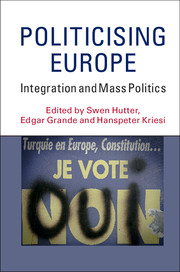Book contents
- Frontmatter
- Contents
- List of figures
- List of tables
- List of contributors
- Preface and acknowledgements
- Part I Theory and methods
- Part II Mapping the politicisation of European integration
- 3 The politicisation of Europe in public debates on major integration steps
- 4 Is the giant still asleep? The politicisation of Europe in the national electoral arena
- 5 Protesting European integration: politicisation from below?
- Part III Driving forces and consequences of politicisation
- Part IV Conclusions
- Methodological Appendix: measuring politicisation, benchmarks and data
- Bibliography
- Index
5 - Protesting European integration: politicisation from below?
from Part II - Mapping the politicisation of European integration
Published online by Cambridge University Press: 05 March 2016
- Frontmatter
- Contents
- List of figures
- List of tables
- List of contributors
- Preface and acknowledgements
- Part I Theory and methods
- Part II Mapping the politicisation of European integration
- 3 The politicisation of Europe in public debates on major integration steps
- 4 Is the giant still asleep? The politicisation of Europe in the national electoral arena
- 5 Protesting European integration: politicisation from below?
- Part III Driving forces and consequences of politicisation
- Part IV Conclusions
- Methodological Appendix: measuring politicisation, benchmarks and data
- Bibliography
- Index
Summary
Introduction
The previous chapters have traced the politicisation of Europe by looking at contestation both around key integration steps and national elections. Generally speaking, the results support the claim that the European integration process has become politicised since the 1990s. At the same time, they suggest that public conflicts over Europe are still very much an elite affair. While the study of election campaigns focused exclusively on political parties, the integration debates turned out to be dominated by public authority actors. Less powerful actors, such as civil society or social movement organisations (SMOs), were hardly present in these public debates (see also Koopmans 2007, 2010; Helbling et al. 2012: 216–220 and Statham and Trenz 2013a: 85–93). While this finding casts doubt on the idea that social movements and other civil society actors are key to the politicisation of Europe, as suggested by Beck and Grande (2007) and Habermas (2012), we still lack a systematic assessment of this claim.
This chapter provides such an assessment by testing our ‘mass politics hypothesis’ (see Chapter 1). In other words, the chapter answers the question of whether European integration has become part and parcel of mass politics, i.e., whether non-party challengers and ordinary citizens are becoming more involved in conflicts over Europe. To do this, the chapter shifts attention to the protest arena. More specifically, we ask whether and to what extent European integration has become politicised in the protest arenas of the six countries. The protest arena's centre and pivotal point is the direct participation of people in protest events. Mobilising this active participation is a core competence and resource of the collective actors involved in protest politics (Hutter 2014a: 26–29). Taking up Schattschneider's (1975 [1960]: 1) words again, the protest arena is the channel where the ‘crowd’ can enter the fight without institutional, thematic or territorial boundaries. Thus, we change our research strategy and focus on protest events that are thematically related to European integration – either directly in terms of the issues articulated by the protesters or indirectly by means of the justification frames used or the addressee of the event (for the data collection strategy, see Chapter 2).
The focus on protest events reflects our general definition of politicisation as involving three dimensions: salience, polarisation and actor expansion.
- Type
- Chapter
- Information
- Politicising EuropeIntegration and Mass Politics, pp. 112 - 134Publisher: Cambridge University PressPrint publication year: 2016
- 15
- Cited by



